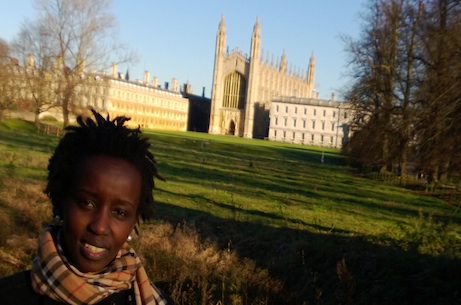
A paper by Njoki Wamai aimed at helping social science researchers embarking on fieldwork for the first time has been published by the Oxford Journal of Human Rights Practice.
A paper by a Gates Cambridge Scholar aimed at helping social science researchers embarking on fieldwork for the first time has been published by the Oxford Journal of Human Rights Practice.
Njoki Wamai’s practice note, First Contact with the field: Experiences of an Early Career Researcher in the Context of National and International Politics in Kenya, was part of three other practice notes from early career social science researchers researching in human rights-related settings in three different countries in the global south and global north.
Njoki [2012] has been carrying out field research in in Kenya where the International Criminal Court (ICC) is working with victims of the 2008 post-election violence in three counties. She has been investigating how victims and residents of these counties perceive the ICC and the kind of justice that they envision for themselves.
The practice note is a reflection on the methodological aspects of fieldwork for first-time researchers in the social sciences and is a response to a perceived lack of literature on the practical aspects of fieldwork for such researchers. It takes into account that, although training on methodology and ethics is done before fieldwork, practical aspects cannot be taught and most learning takes place in the field. Njoki says: “This is a daunting task for first-time researchers who must learn on the go while they strive to complete their research within a time limit.”
Some of Njoki’s recommendations based on her own research include the need for an improvement in training methods classes before fieldwork through the inclusion of role play on complex fieldwork situations, an emphasis on the need for ethical sensibilities and critical intelligence. Most importantly, however, she highlights researchers’ need for flexibility, creativity, patience, humility and commonsense to navigate the complexities of fieldwork. She adds that practical aspects like self care and keeping a diary reflecting on time spent in the field and allowing for unplanned events should be emphasised and shared.
Njoki also learnt that acquiring a “social permit” from the community was more important than acquiring a legal permit for research from the government authorities. In the paper, she also discusses issues of gaining trust, safety and access as well as how to negotiate gatekeepers, manage expectations while creating reciprocal relationships with research participants and the challenges and advantages to being a female Kenyan national researching her own country.
Njoki concludes: “I have found that the ‘how to’ of fieldwork is best learnt in the field… There is a need for a mixture of preparation, creativity, flexibility, patience, respect and awareness of the cultural context in which one operates. I have learnt that research ethics should not only be a set of rules one carries from the academy to the field, but a relational experience that ensures mutual respect and sensitivity to my fellow research participants on an everyday basis’.
The full paper can be accessed here.












